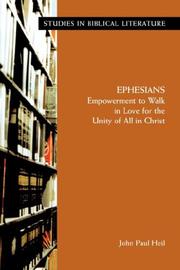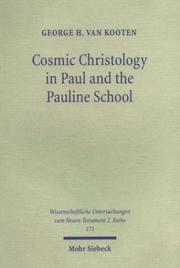| Listing 1 - 10 of 13 | << page >> |
Sort by
|
Book
ISBN: 1577997735 9781577997733 Year: 2017 Publisher: Lexham Press
Abstract | Keywords | Export | Availability | Bookmark
 Loading...
Loading...Choose an application
- Reference Manager
- EndNote
- RefWorks (Direct export to RefWorks)
Book
ISBN: 0585402892 9780585402895 9780836197969 0836197968 Year: 2002 Publisher: Waterloo, Ont. Scottdale, Penn. Herald Press
Abstract | Keywords | Export | Availability | Bookmark
 Loading...
Loading...Choose an application
- Reference Manager
- EndNote
- RefWorks (Direct export to RefWorks)
Book
ISBN: 157506636X 9781575066363 9781575068145 1575068141 Year: 2011 Publisher: Winona Lake, Ind. Eisenbrauns
Abstract | Keywords | Export | Availability | Bookmark
 Loading...
Loading...Choose an application
- Reference Manager
- EndNote
- RefWorks (Direct export to RefWorks)
Book
ISBN: 020313091X 1280335742 1134867417 0203303903 9780203303900 1134867409 Year: 1994 Publisher: London ; New York : Routledge,
Abstract | Keywords | Export | Availability | Bookmark
 Loading...
Loading...Choose an application
- Reference Manager
- EndNote
- RefWorks (Direct export to RefWorks)
This study approaches the Epistle to the Ephesians in a radically different way from traditional commentaries. Rather than analysing each individual verse, Martin Kitchen examines the complete text within the framework of contemporary biblical criticism. He acknowledges the debt which biblical studies owes to historical method, while at the same time recognizing the need to view the Epistle against the background of recent literary approaches to New Testament texts. Ephesians also takes into account the important questions of whether the Epistle was written by St Paul and, if not, why
Bible.-- N.T.-- Ephesians-- Commentaries. --- Christian life. --- Bible. --- Christian life --- Christians --- Discipleship --- Religious life --- Theology, Practical --- Christianity --- Ebesosŏ (Book of the New Testament) --- Epheserbrief (Book of the New Testament) --- Ephesians (Book of the New Testament)

ISBN: 1435627040 9781435627048 1589832671 9781589832671 9781589832671 Year: 2007 Publisher: Atlanta Society of Biblical Literature
Abstract | Keywords | Export | Availability | Bookmark
 Loading...
Loading...Choose an application
- Reference Manager
- EndNote
- RefWorks (Direct export to RefWorks)
Christianity. --- Christianity --- Religions --- Church history --- Bible. --- Ebesosŏ (Book of the New Testament) --- Epheserbrief (Book of the New Testament) --- Ephesians (Book of the New Testament) --- Criticism, interpretation, etc. --- 227.1*4 --- 227.1*4 Brief van Paulus aan de Efesiërs --- Brief van Paulus aan de Efesiërs
Book
ISBN: 148751199X 9781487511999 9781442641938 1442641932 1487512007 Year: 2017 Publisher: Toronto
Abstract | Keywords | Export | Availability | Bookmark
 Loading...
Loading...Choose an application
- Reference Manager
- EndNote
- RefWorks (Direct export to RefWorks)
Volume 58 in the Collected Works of Erasmus series contains, for the first time, the English translation of Erasmus' Annotations on Paul's Epistles to the Galatians and Ephesians.
Erasmus, Desiderius, --- Bible. --- Ebesosŏ (Book of the New Testament) --- Epheserbrief (Book of the New Testament) --- Ephesians (Book of the New Testament) --- Brief aan die Galasiërs --- Epistle to the Galatians (Book of the New Testament) --- Galasiërs --- Galatians (Book of the New Testament) --- Galladia --- Galladia-sŏ --- Galladiasŏ --- Garateya sho --- Kalladiasŏ --- HISTORY / Renaissance.

ISBN: 3161480074 9783161480072 3161571908 Year: 2003 Volume: 171 Publisher: Tübingen: Mohr Siebeck,
Abstract | Keywords | Export | Availability | Bookmark
 Loading...
Loading...Choose an application
- Reference Manager
- EndNote
- RefWorks (Direct export to RefWorks)
Reflexionen über Gott, Christus und den Kosmos in den Schriften des Paulus und der Paulinischen Schule zeigen, daß diese Autoren die griechisch-römische Kosmologie und Theologie gut kannten. Sie könnten sogar möglicherweise eine Denkweise angenommen haben, in der diese Kosmologie mit dem Judentum eine Synthese eingegangen war und in der Jesus als eine Art kosmischer Gott gedeutet wurde.Vor diesem Hintergrund wirft George van Kootens Untersuchung auch ein neues Licht auf das Verhältnis zwischen Kolosser- und Epheserbrief.
Cosmology, Ancient. --- 227.08 --- 232 --- Paulinische theologie --- Jezus Christus. Christologie: dogmatisch. De Verbo incarnato --- 227.08 Paulinische theologie --- Cosmology, Ancient --- Ancient cosmology --- Bible. --- Ebesosŏ (Book of the New Testament) --- Epheserbrief (Book of the New Testament) --- Ephesians (Book of the New Testament) --- Colossians (Book of the New Testament) --- Kolosserbrief (Book of the New Testament) --- Criticism, interpretation, etc. --- Philosophie --- Theologie --- Paul --- Geschichte --- Christentum --- Metaphysik --- Judaistik --- Antike --- Kosmos --- Pauls Brief --- Aphrodite --- Eros --- Osiris --- Neues Testament --- Religionsphilosophie
Book
ISBN: 1283856875 3110281880 9783110281224 3110281228 9781283856874 9783110281880 3110281899 Year: 2012 Publisher: Berlin ; Boston : De Gruyter,
Abstract | Keywords | Export | Availability | Bookmark
 Loading...
Loading...Choose an application
- Reference Manager
- EndNote
- RefWorks (Direct export to RefWorks)
This book introduces and translates Sedulius Scottus' Prologue (to the entire Collectaneum in Apostolum) and commentaries on Galatians and Ephesians. The introduction outlines the historical context of composition, identifies Sedulius' literary model - Servius, discusses Sedulius' organizing trope for the Prologue - the septem circumstantiae, asserts for what purpose and for whom he composed the Collectaneum, explains pertinent philological and stylistic issues, such as formatting, existing (or lack thereof) traits of Hiberno Latin, and Sedulius' knowledge of Greek, and it explores his use of exegetical and theological sources - predominantly Jerome, Augustine, and Pelagius. Since the commentaries are based upon these formative religious authors (among many others), the introduction also surveys Sedulius' doctrinal stances on important theological and ecclesiastical issues of his own time with particular relation to his reception of these authors. Sedulius' Collectaneum in Apostolum reveals an erudite author familiar with the style of classical commentaries, which he uses to harmonize the sometimes discordant voices of patristic authors for the purposes of education in accordance with Carolingian programmatic aims.
Latin poetry, Medieval and modern --- History and criticism. --- Sedulius, --- Bible. --- Ebesosŏ (Book of the New Testament) --- Epheserbrief (Book of the New Testament) --- Ephesians (Book of the New Testament) --- Brief aan die Galasiërs --- Epistle to the Galatians (Book of the New Testament) --- Galasiërs --- Galatians (Book of the New Testament) --- Galladia --- Galladia-sŏ --- Galladiasŏ --- Garateya sho --- Kalladiasŏ --- Carolingian Biblical Exegesis. --- Collectaneum in Apostolum. --- Patristics. --- Sedulius Scottus.
Book
ISBN: 9789004180536 9004180532 1282951556 9786612951558 9004180540 9789004180543 9781282951556 6612951559 Year: 2010 Volume: 133 Publisher: Leiden: Brill,
Abstract | Keywords | Export | Availability | Bookmark
 Loading...
Loading...Choose an application
- Reference Manager
- EndNote
- RefWorks (Direct export to RefWorks)
Although scholarship has noted the thematic importance of peace in Ephesians, few have examined its political character in a sustained manner throughout the entire letter. This book addresses this lacuna, comparing Ephesians with Colossians, Greek political texts, Dio Chrysostom’s Orations , and the Confucian Four Books in order to ascertain the rhetorical and political nature of its topos of peace. Through comparison with analogous documents both within and without its cultural milieu, this study shows that Ephesians can be read as a politico-religious letter “concerning peace” within the church. Its vision of peace contains common political elements (such as moral education, household management, communal stability, a universal humanity, and war) that are subsumed under the controlling rubric of the unity and cosmic summing up of all things in Christ.
Peace --- Paix --- Biblical teaching. --- Religious aspects --- Enseignement biblique --- Aspect religieux --- Dio, --- Bible. --- Si shu. --- Biblical teaching --- Bible --- Criticism, interpretation, etc --- 227.1*4 --- Brief van Paulus aan de Efesiërs --- Ebesosŏ (Book of the New Testament) --- Epheserbrief (Book of the New Testament) --- Ephesians (Book of the New Testament) --- Criticism, interpretation, etc. --- 227.1*4 Brief van Paulus aan de Efesiërs --- Ssu shu --- Kyŏngsŏ --- Sasŏ --- Sze shoo --- Seu-chou --- Se chou --- Sse-chou --- Four Books --- Quatre livres --- 四書 --- Sishu --- Da xue --- Zhong yong --- Peace - Biblical teaching --- Dio, - Chrysostom - Speeches
Book
ISBN: 9783319102382 3319102370 9783319102375 3319102389 Year: 2015 Publisher: Cham : Springer International Publishing : Imprint: Springer,
Abstract | Keywords | Export | Availability | Bookmark
 Loading...
Loading...Choose an application
- Reference Manager
- EndNote
- RefWorks (Direct export to RefWorks)
This book considers Martin Bucer (1491-1551) as a teacher of theology, focusing on his time as Regius Professor of Divinity at the University of Cambridge between 1549 and 1551. The book is centered on Bucer’s Cambridge lectures on Ephesians (1550-1551), analyzing them to find out how they display his method of teaching and “doing” theology, and in particular how they shed light on the relationship between biblical exegesis and theological formulation as he understood it. Divided into two interconnected parts, the first part establishes the historical context for the lectures, including a broad sketch of scholastic method in theology and the biblical humanist critique of, and alternative to, that method. The second part closely examines Bucer’s practice in his Cambridge lectures, showing the extent to which he was a theologian of the biblical humanist school, influenced (from early in his career) by the method Erasmus set forth in the Ratio Verae Theologiae in which true theology begins, ends, and is best done as an exercise in the exegesis of the Word of God.
Humanities / Arts. --- Religious Studies. --- Religion and Education. --- History. --- Humanities. --- Religion and education. --- Religion (General). --- Sciences humaines --- Histoire --- 2 BUCER, MARTIN --- 227.1*4 --- Godsdienst. Theologie--BUCER, MARTIN --- Brief van Paulus aan de Efesiërs --- Religion --- Philosophy & Religion --- Religion - General --- 227.1*4 Brief van Paulus aan de Efesiërs --- 2 BUCER, MARTIN Godsdienst. Theologie--BUCER, MARTIN --- Humanism. --- Bible. --- Ebesosŏ (Book of the New Testament) --- Epheserbrief (Book of the New Testament) --- Ephesians (Book of the New Testament) --- Religion. --- Church and education. --- Religious Studies, general. --- History, general. --- Philosophy --- Classical education --- Classical philology --- Philosophical anthropology --- Renaissance --- Religion, Primitive --- Atheism --- God --- Irreligion --- Religions --- Theology --- Annals --- Auxiliary sciences of history --- Education and church --- Education
| Listing 1 - 10 of 13 | << page >> |
Sort by
|

 Search
Search Feedback
Feedback About UniCat
About UniCat  Help
Help News
News